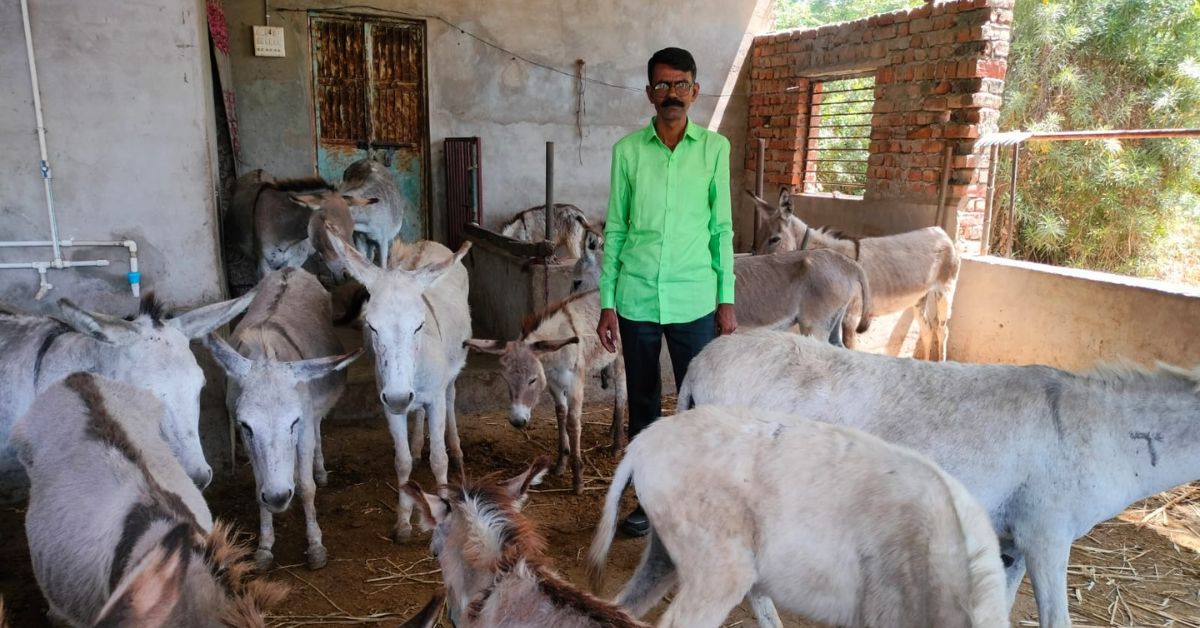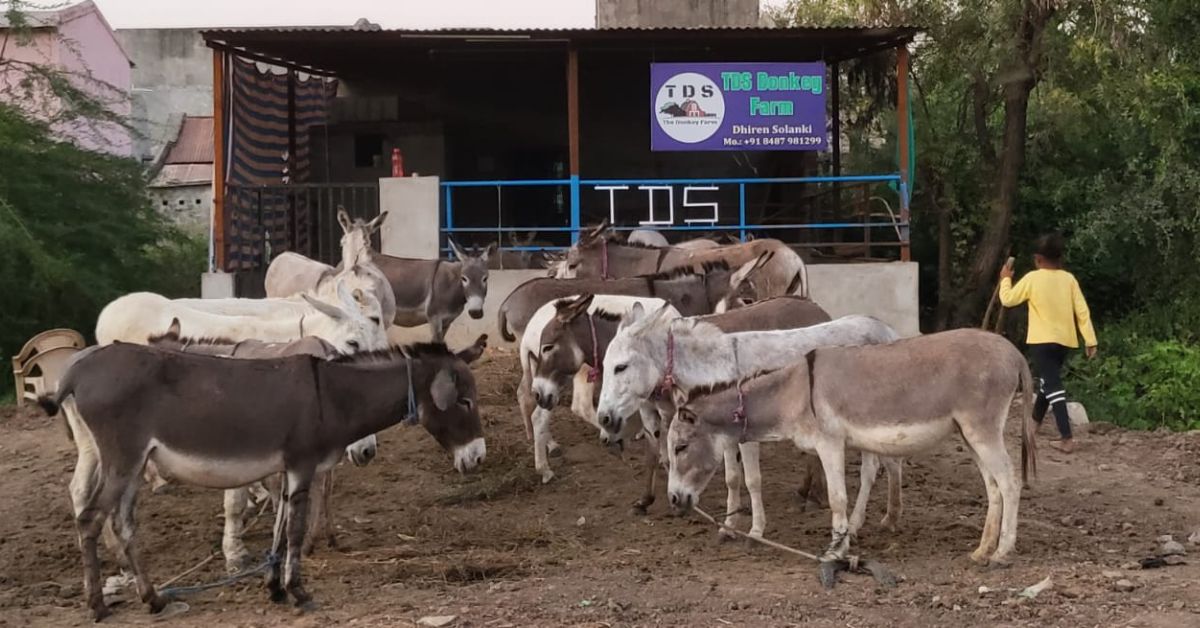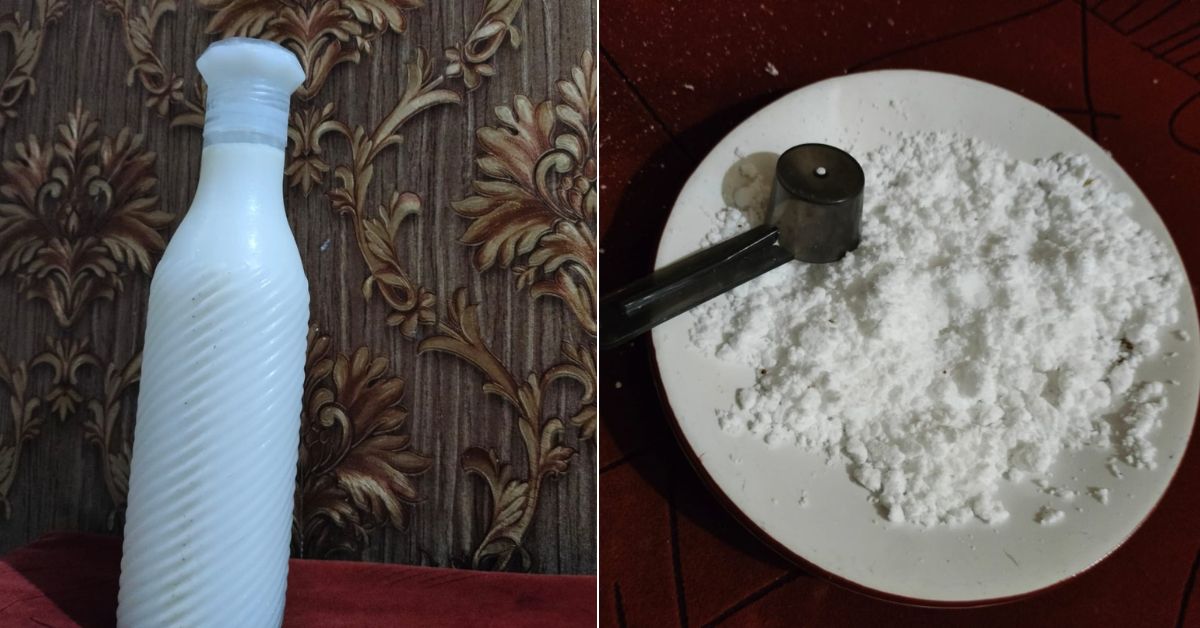“If I had become a government teacher, I would be earning Rs 30,000 in a month – an amount that I generate in roughly three days. With the government job, I could have only cleared my EMIs, not fulfilled my dreams.”
In 2022, Dhiren Solanki quit his fantasy of landing a government job to become a farmer. Unlike traditional agriculture practices, he turned to creating a livelihood out of donkeys!
Historically, donkeys have been primarily used as pack animals to pull ploughs and carts, deliver goods to market, collect water from wells, and in the construction industry. However, these donkeys are rarely used as agricultural animals like cows, buffaloes, and goats.
Interestingly, donkeys have become a good revenue source for Dhiren. At 22, he set up a multi-lakh business earning Rs 3 lakh per month by selling In conversation with The Better India, he explains how he stood out in making donkey milk a profitable farming business.

Following his father’s advice, Dhiren quit his fantasy of landing a government job to become a farmer.
Like his father, Dhiren’s childhood aspiration was to pursue a career in teaching. So, after completing his schooling in science, he started preparing for the government examinations in 2020.
“There are limited vacancies for government jobs and there is too much competition in this field. Anyway, I appeared for many state and central-level examinations in February 2020 but I did not get any results. I was sitting idle for at least six months, I did not know what to do and was just waiting for my results. I was getting demotivated,” he says.
In early 2021, his father read about the donkey-rearing business in Karnataka and Kerala. “This concept was not at all popularised in the North. Although there is little demand for donkey milk in the country, it has huge demand in countries like Turkey, Malaysia, and China,” he adds.
“At a time when people are bothered by soaring prices of cow and at Rs 60 per litre, they are not interested in buying donkey milk which is sold for Rs 3,500 a litre. But it has an international market and is widely used in pharmaceutical and cosmetics industries to make products like moisturisers, baby cream, and soaps,” he adds.
A reveals that donkey milk stimulates the immune system, regulates the gastrointestinal flora, and prevents inflammatory diseases. It has long been used as an alternative for infants and patients with Cow’s Milk Protein Allergy (CMPA).

In 2022, Dhiren started TDS Donkey Farm without any formal training.
Dhiren says the demand for donkey milk also increased amid the COVID-19 pandemic to make immunity-boosting tablets. Other than its potential roles in human nutrition, donkey milk is used in ethnomedicine, and cosmetology, most likely due to its lysozyme content, and smoothing skin and scalp inflammations.
Considering a potential business opportunity, Dhiren shifted his focus to set up a donkey farm in his village Manund of Patan district, Gujarat.
In 2022, Dhiren started TDS Donkey Farm without any formal training. For this, he also took a loan of Rs 37 lakh to buy 20 donkeys and set up a 40×30 feet shed.
“I took the risk as I was confident and positive. But I overlooked the risk and my decision turned out to be wrong,” he says.
“I thought that I would purchase donkeys, milk them one day, and sell their milk the next day. This was not at all possible. I did not consider its low shelf life. There was no proper local market for it and it could not be sent abroad in its liquid form via plane or ship due to this,” he shares.
In the first year, he incurred losses up to Rs 40 lakh as he had to throw 3,000 litres of milk down the drain. The only solution was to transport the milk abroad by converting it into dry powder form for transportation. But it took him a year to understand this and find suitable companies that did this process.

Dhiren informs that it takes 17 litres of milk to make one kg powder.
“I sought help from a marketing company and bought their annual package of Rs 3.5 lakh which brought in customers. After more than a year, I got my first order of 50 kg milk powder,” he adds.
By that time, Dhiren had already stored 200 kg of milk powder. He shares, “It takes 17 litres of milk to make one kg powder. It is sold for Rs 63,000 per kg in the international market,” he adds.
After initial hiccups, Dhiren was able to scale up the business and gradually expanded his farm to 50 donkeys. The current daily at his farm is about 15 litres.
He adds that he also ensures the general well-being of the donkeys at his farm. “We make sure that the donkeys are not exploited for milk. In our village, we have a veterinary hospital very close to our farm. We get them treated and vaccinated for tetanus every year and give them B-complex supplements every month,” he adds.
Looking back at his success, Dhiren says, “With this work, I feel I have also been able to raise some respect for donkeys that are considered of no value in the Indian setup. Besides, I have also been able to get fame at a very young age. Had I been in a government job, nobody would have known of my existence,” he says.
Edited by Padmashree Pande. All photos: Dhiren Solanki.
In 2022, Dhiren Solanki quit his fantasy of landing a government job to become a farmer. Unlike traditional agriculture practices, he turned to creating a livelihood out of donkeys!
Historically, donkeys have been primarily used as pack animals to pull ploughs and carts, deliver goods to market, collect water from wells, and in the construction industry. However, these donkeys are rarely used as agricultural animals like cows, buffaloes, and goats.
Interestingly, donkeys have become a good revenue source for Dhiren. At 22, he set up a multi-lakh business earning Rs 3 lakh per month by selling In conversation with The Better India, he explains how he stood out in making donkey milk a profitable farming business.

Following his father’s advice, Dhiren quit his fantasy of landing a government job to become a farmer.
Donkey milk – a hidden gem
Like his father, Dhiren’s childhood aspiration was to pursue a career in teaching. So, after completing his schooling in science, he started preparing for the government examinations in 2020.
“There are limited vacancies for government jobs and there is too much competition in this field. Anyway, I appeared for many state and central-level examinations in February 2020 but I did not get any results. I was sitting idle for at least six months, I did not know what to do and was just waiting for my results. I was getting demotivated,” he says.
In early 2021, his father read about the donkey-rearing business in Karnataka and Kerala. “This concept was not at all popularised in the North. Although there is little demand for donkey milk in the country, it has huge demand in countries like Turkey, Malaysia, and China,” he adds.
“At a time when people are bothered by soaring prices of cow and at Rs 60 per litre, they are not interested in buying donkey milk which is sold for Rs 3,500 a litre. But it has an international market and is widely used in pharmaceutical and cosmetics industries to make products like moisturisers, baby cream, and soaps,” he adds.
A reveals that donkey milk stimulates the immune system, regulates the gastrointestinal flora, and prevents inflammatory diseases. It has long been used as an alternative for infants and patients with Cow’s Milk Protein Allergy (CMPA).

In 2022, Dhiren started TDS Donkey Farm without any formal training.
Dhiren says the demand for donkey milk also increased amid the COVID-19 pandemic to make immunity-boosting tablets. Other than its potential roles in human nutrition, donkey milk is used in ethnomedicine, and cosmetology, most likely due to its lysozyme content, and smoothing skin and scalp inflammations.
Considering a potential business opportunity, Dhiren shifted his focus to set up a donkey farm in his village Manund of Patan district, Gujarat.
Didn’t get held up after Rs 40 lakh losses
In 2022, Dhiren started TDS Donkey Farm without any formal training. For this, he also took a loan of Rs 37 lakh to buy 20 donkeys and set up a 40×30 feet shed.
“I took the risk as I was confident and positive. But I overlooked the risk and my decision turned out to be wrong,” he says.
“I thought that I would purchase donkeys, milk them one day, and sell their milk the next day. This was not at all possible. I did not consider its low shelf life. There was no proper local market for it and it could not be sent abroad in its liquid form via plane or ship due to this,” he shares.
In the first year, he incurred losses up to Rs 40 lakh as he had to throw 3,000 litres of milk down the drain. The only solution was to transport the milk abroad by converting it into dry powder form for transportation. But it took him a year to understand this and find suitable companies that did this process.

Dhiren informs that it takes 17 litres of milk to make one kg powder.
“I sought help from a marketing company and bought their annual package of Rs 3.5 lakh which brought in customers. After more than a year, I got my first order of 50 kg milk powder,” he adds.
By that time, Dhiren had already stored 200 kg of milk powder. He shares, “It takes 17 litres of milk to make one kg powder. It is sold for Rs 63,000 per kg in the international market,” he adds.
After initial hiccups, Dhiren was able to scale up the business and gradually expanded his farm to 50 donkeys. The current daily at his farm is about 15 litres.
He adds that he also ensures the general well-being of the donkeys at his farm. “We make sure that the donkeys are not exploited for milk. In our village, we have a veterinary hospital very close to our farm. We get them treated and vaccinated for tetanus every year and give them B-complex supplements every month,” he adds.
Looking back at his success, Dhiren says, “With this work, I feel I have also been able to raise some respect for donkeys that are considered of no value in the Indian setup. Besides, I have also been able to get fame at a very young age. Had I been in a government job, nobody would have known of my existence,” he says.
Edited by Padmashree Pande. All photos: Dhiren Solanki.
